Latest Ukraine updates: Kramatorsk attack sparks global outrage
Ukraine-Russia news from April 8: Deadly bombing spurs calls for accountability and pledges of assistance to Ukraine.
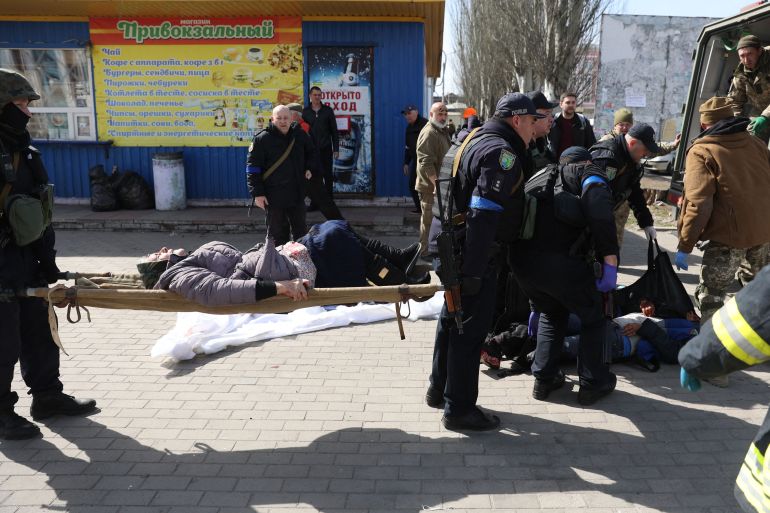
- Ukraine officials say a Russian rocket attack on a civilian-filled railway station in Kramatorsk killed at least 50 people and wounded almost 400; Russia denies the attack.
- The European Commission’s President Ursula von der Leyen and European Union’s foreign policy chief Josep Borrell travel by train to Kyiv to meet Ukrainian President Volodymyr Zelenskyy.
- Zelenskyy warns atrocities in Borodyanka are “much worse” than what the world saw in Bucha.
- Slovakia says it has given its S-300 air defence system to Ukraine to help it defend against Russian attacks.
- Washington will place a Patriot missile system in Slovakia to ensure the country’s “continued security”, President Joe Biden says.
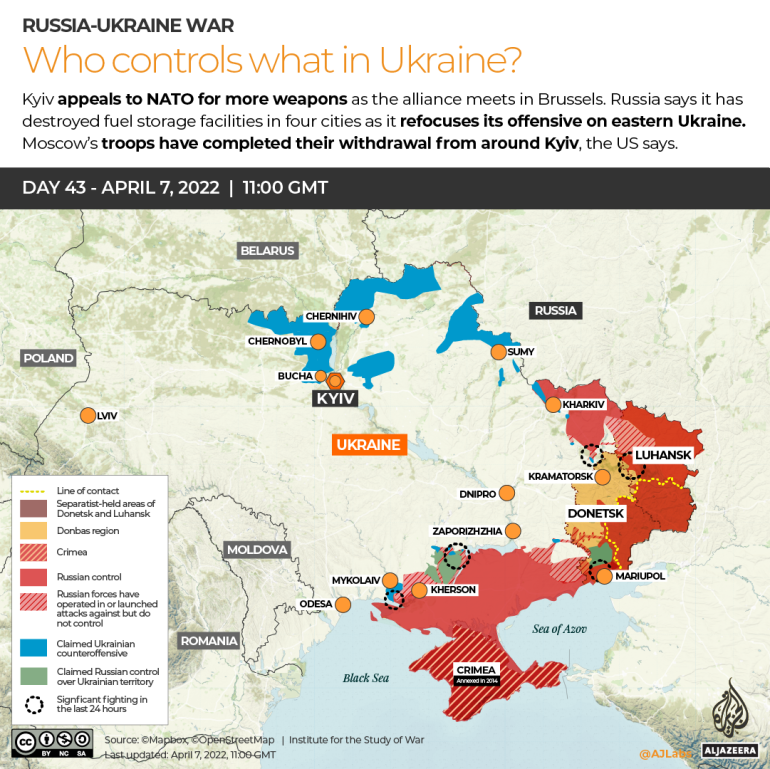
This live blog is now closed; thank you for joining us. Please see the latest Russia-Ukraine news here.
These were the updates on April 8:
Keep reading
list of 3 itemsTimeline: Week six of Russia’s war in Ukraine
Lukashenko demands role in Russia-Ukraine talks
‘We will continue to work on Russia,’ HRW says
Human Rights Watch (HRW) has promised to continue documenting rights abuses by Russia after Moscow revoked the rights group’s registration.
The New York-based organisation said in a series of tweets that there is “little doubt” that Russia’s move is in response to the group’s reporting on the war in Ukraine.
“We will continue to work on Russia, and we will continue to press for the protection of civilians in Russia’s war in #Ukraine,” HRW said.
BREAKING: Russia’s Justice Ministry has deregistered @hrw, after 30 years in #Russia.
The ministry's statement referred vaguely to Russian legislation, but there is little doubt the move was in response to our reporting on the war in #Ukraine. pic.twitter.com/2hMuheyYPJ
— Human Rights Watch (@hrw) April 8, 2022
World reacts to deadly Kramatorsk attack
The bombing of a train station in eastern Ukraine has drawn global condemnation and calls for accountability after Ukrainian officials said the attack on Kramatorsk killed at least 50 people and injured hundreds more.
The spokesperson for UN Secretary-General Antonio Guterres said the attack on Kramatorsk, as well as other attacks on civilians and civilian infrastructure “are completely unacceptable”.
“They are gross violations of international humanitarian law and international human rights law, for which the perpetrators must be held accountable,” Stephane Dujarric said in a statement.
Read more on how world leaders reacted to the attack here.
I strongly condemn this morning’s indiscriminate attack against a train station in #Kramatorsk by Russia, which killed dozens of people and left many more wounded. This is yet another attempt to close escape routes for those fleeing this unjustified war and cause human suffering
— Josep Borrell Fontelles (@JosepBorrellF) April 8, 2022
EU publishes sanctions against Putin’s two daughters
The EU has blacklisted Putin’s two adult daughters and more than 200 other people as part of its latest sanctions package, according to an official list published late on Friday.
Those on the list, which additionally included 18 companies, face asset seizures and travel bans in the 27-nation European bloc.
The United States and the United Kingdom had already sanctioned Putin’s two daughters: Maria Vorontsova and Katerina Tikhonova, born in 1985 and 1986, respectively.
US to support investigations of train station attack: White House
The White House has said the Biden administration will support investigations of the attack on the Kramatorsk train station in Ukraine that authorities said was packed with women, children and elderly refugees.
Several US agencies had previously pledged to assist in gathering evidence of war crimes in Ukraine.
Amnesty ‘undeterred’ by Russia crackdown, says group’s chief
Amnesty International has decried the closing down of its offices in Moscow by Russian authorities, but the rights group promised to redouble efforts to “expose Russia’s egregious human rights violations both at home and abroad”.
“The authorities are deeply mistaken if they believe that by closing down our office in Moscow they will stop our work documenting and exposing human rights violations,” Agnes Callamard, Amnesty’s secretary general, said in a statement.
“We continue undeterred to work to ensure that people in Russia are able to enjoy their human rights without discrimination.”
The Russian Ministry of Justice had revoked the registration of 15 foreign organisations, including Amnesty, Human Rights Watch and the Carnegie Endowment for International Peace.
The Russian authorities are closing down @Amnesty. We are the latest in a long list of organizations that have been punished for defending human rights and speaking the truth to the Russian authorities. https://t.co/naNFFPhdng
— Agnes Callamard (@AgnesCallamard) April 8, 2022
US believes Russia used short-range ballistic missile in Kramatorsk attack: Official
The US believes Russia used a short-range ballistic missile to hit the Kramatorsk railway station in east Ukraine, a senior US defence official has said.
The official was cited by the Reuters news agency as saying the Pentagon believes Russian forces used an SS-21 Scarab missile, but that the motivation for the attack was not clear.
Attack on Ukraine train station ‘crime against humanity’: France
The attack on the Kramatorsk rail station can be classified as a crime against humanity, France has said.
“They hit a station where there are refugees, civilians and so this can be seen as a crime against humanity,” Foreign Minister Jean-Yves Le Drian told France 5 television, calling for experts to head to the scene in Kramatorsk to gather evidence so that the perpetrators can be held to account.
Biden calls Kramatorsk attack ‘another horrific atrocity’ by Russia
Biden has called the attack on the Kramatorsk train station that killed dozens of civilians trying to flee to safety in Ukraine “another horrific atrocity committed by Russia”.
“We will continue our security assistance and weapons deliveries to help Ukraine defend their country,” Biden wrote on Twitter.
“And, together with our allies and partners, we will support efforts to investigate this attack as we document Russia’s actions and hold them accountable.”
The attack on a Ukrainian train station is yet another horrific atrocity committed by Russia, striking civilians who were trying to evacuate and reach safety.
— President Biden (@POTUS) April 8, 2022
Austrian chancellor to meet Zelenskyy in Kyiv
Austrian Chancellor Karl Nehammer has set off on a one-day trip to Ukraine during which he will meet Zelenskyy in Kyiv and visit Bucha, his office has said.
Neutral Austria has been providing humanitarian aid to Ukraine as well as helmets and body armour for civilians rather than weapons.
“It is important that within the framework of our neutrality we stand by Ukraine on a humanitarian level as well as politically,” Nehammer said in the statement issued by his office. “My visit to Kyiv and Bucha … serves to show our solidarity with the Ukrainian population.”
Russia revokes registration of Amnesty, Human Rights Watch
The Russian Ministry of Justice has said in a statement that it revoked the registration of 15 foreign organisations, including those of Amnesty International and Human Rights Watch.
The Russian branches of the organisations, which also included the Carnegie Endowment for International Peace, “were excluded due to the discovery of violations of the current legislation of the Russian Federation”, the statement said.
US to place Patriot missile system in Slovakia: Biden
Biden has thanked the Slovakian government for providing an S-300 air defence system to Ukraine, saying that Washington will place a US Patriot missile system in Slovakia to ensure the country’s “continued security”.
“As the Russian military repositions for the next phase of this war, I have directed my Administration to continue to spare no effort to identify and provide to the Ukrainian military the advanced weapons capabilities it needs to defend its country,” Biden said in a statement.
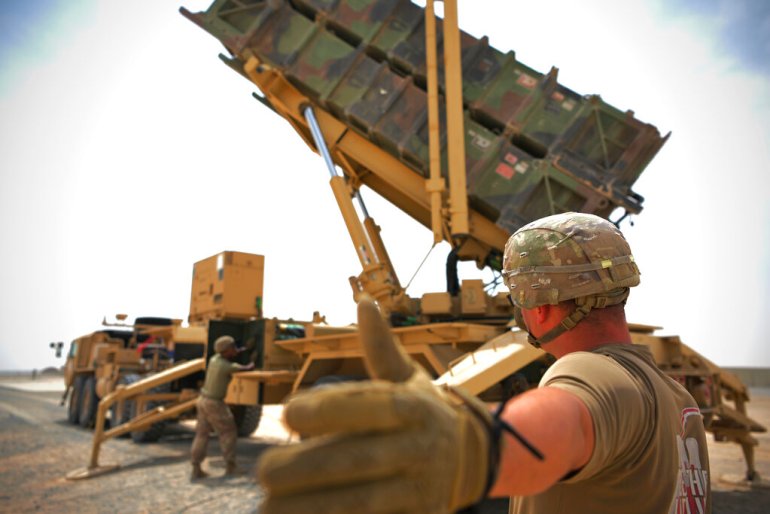
UK sending more ‘high-grade’ weapons to Ukraine, says PM Johnson
British Prime Minister Boris Johnson has said the UK is sending Ukraine more Starstreak anti-aircraft missiles and 800 anti-tank missiles after the “unconscionable” attack on Kramatorsk.
The “high-grade military equipment” is worth £100 million ($130m), Johnson said, with the UK anti-tank missiles seen as particularly potent against Russian forces.
The attack on the railway station at Kramatorsk “shows the depths to which Putin’s once-vaunted army has sunk”, he told reporters alongside German Chancellor Olaf Scholz.
Odesa imposes weekend curfew over ‘missile strike threat’
Ukraine’s southern city of Odesa has imposed a weekend-long curfew over a “missile strike threat” from Russia.
“A curfew will be introduced in Odesa and Odesa region from 9pm on April 9 to 6pm April 11,” Odesa’s regional military administration said on Facebook. The decision was taken “given events in Kramatorsk” and “threat of a missile strike on Odesa”, it said.
Ukraine war disruptions send food prices to their highest ever: UN index
World food prices hit an all-time high in March following Russia’s invasion of Ukraine – an agricultural powerhouse – a United Nations agency has said.
The disruption in export flows resulting from the invasion and international sanctions against Russia has spurred fears of a global hunger crisis, especially across the Middle East and Africa.
The UN Food and Agriculture Organization (FAO) said its Food Price Index, which tracks monthly changes in international prices for a basket of commodities, averaged 159.3 points last month, up 12.6 percent from February. As it is, the February index was the highest level since its inception in 1990.
Spain’s defence minister expects increased ‘cruelty’ in Ukraine
Spain’s defence minister has said the killings and alleged torture of civilians in the town of Bucha were “the tip of the iceberg” when it comes to atrocities committed since Russian forces invaded Ukraine.
Margarita Robles told Antena 3 news channel that an expected Russian offensive in the eastern Donbas region – where pro-Russian separatists have been fighting Ukrainian government forces since 2014 – will likely bring more horror.
She predicted increased “cruelty” would be inflicted by Russian forces in the region.
EU’s von der Leyen visits Bucha mass grave
The European Commission president has visited a mass grave in Bucha, a town outside Kyiv where Russian forces are accused by Ukraine’s allies of carrying out atrocities against civilians.
An AFP journalist reported that von der Leyen was in the town north of the capital as part of a trip to shore up support for Ukraine alongside the bloc’s foreign policy chief Josep Borrell.
Slovakia’s Prime Minister Eduard Heger was also on the trip.
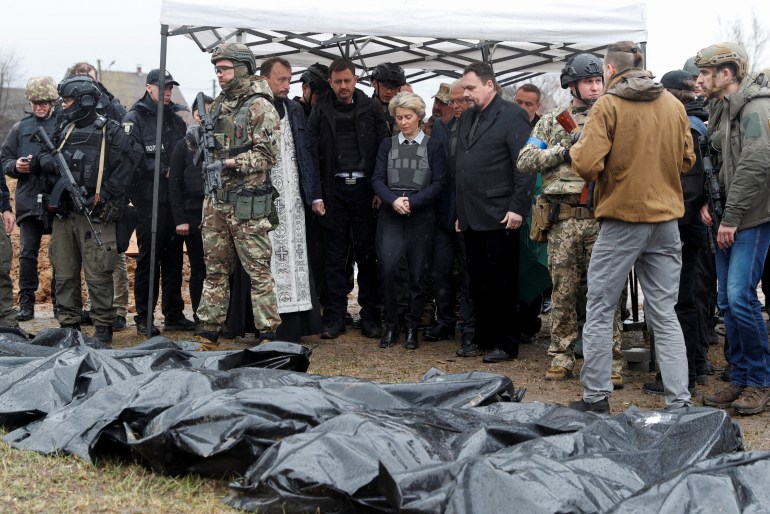
Ukraine conflict backdrop to French elections
The Ukraine war has featured as a backdrop to the French presidential elections, of which the first round will be held on Sunday.
The war has affected most presidential front-runners, with analysts saying President Emmanuel Macron, who has consistently led the race, is benefitting from the “rallying around the flag” phenomenon.
Read more here.
Death toll from missile attack in Kramatorsk rises to 50, says governor
At least 50 people were killed, including five children, in a strike on a rail station in the eastern Ukrainian city of Kramatorsk, regional governor Pavlo Kyrylenko has said.
In an online post updating an earlier preliminary death toll of 39, Kyrylenko said the dead included victims who had died of their wounds after being taken to hospital or medical centres.
Nearly 400 people were wounded in the strike, according to Kyrylenko, with many in critical condition.
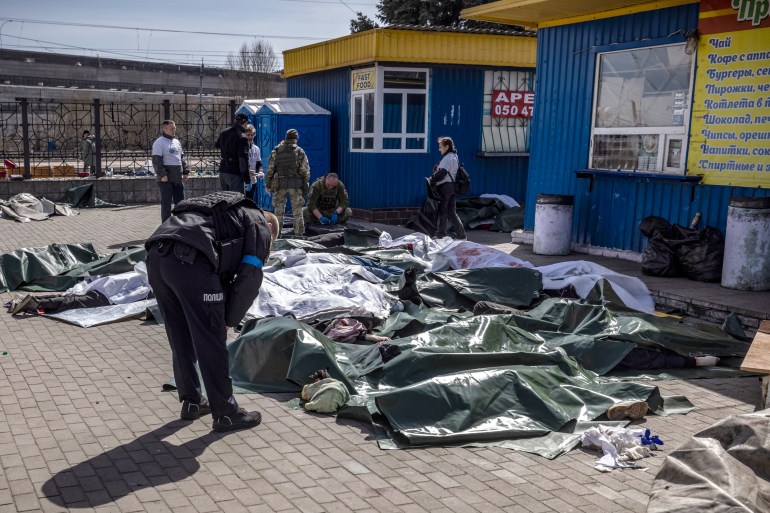
208 houses, 46 schools damaged in Kyiv: official
Russian shelling damaged 208 residential buildings and 46 schools in Kyiv, a city official has said.
The shelling, which began on the day Russia invaded Ukraine on February 24, also damaged 29 kindergartens and one orphanage, Mykola Povoroznik of the Kyiv state administration said in a web-posted statement.
The figures do not include the damage and destruction in the suburbs northwest and northwest of Kyiv, including Bucha, Irpin and Borodyanka that were severely pummeled for weeks.
Reporting by Al Jazeera’s Mansur Mirovalev in Vinnytsia, Ukraine.
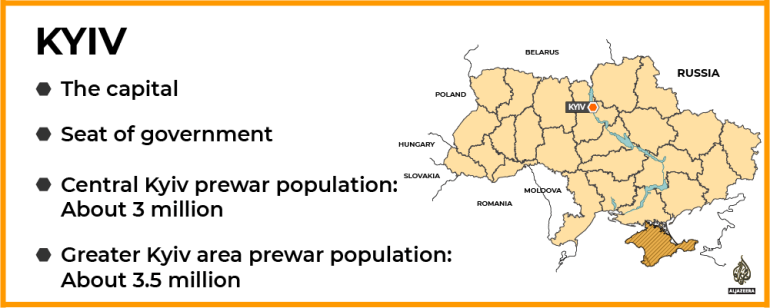
Odesa region sees no signs of Russia preparing landing operation: Official
Ukrainian authorities in the southern coastal region of Odesa do not see signs that Russian forces are preparing a landing operation from the Black Sea, regional spokesperson Serhiy Bratchuk has said.
In an online briefing, Bratchuk said the region had been hit by missile strikes late on Thursday, which caused an as yet unknown number of casualties.
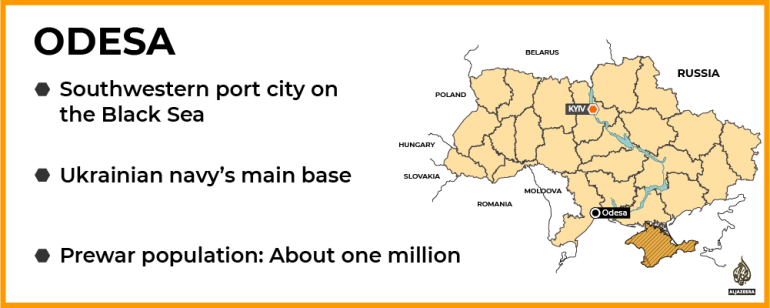
US embassy: Kramatorsk rail strike ‘one more atrocity’ by Russian forces
The US embassy in Ukraine has described a missile strike on an eastern rail station as “one more atrocity” committed by Russian troops in Ukraine.
“The Russian missile attack on the Kramatorsk railway station, a hub for civilian evacuations, which left dozens of people killed and more than 100 injured, is one more atrocity committed by Russia in Ukraine. The world will hold (Russian President Vladimir) Putin to account,” it said on Twitter.
Russia denied launching the attack.
The Russian missile attack on the Kramatorsk railway station, a hub for civilian evacuations, which left dozens of people killed and more than 100 injured, is one more atrocity committed by Russia in Ukraine. The world will hold Putin to account. pic.twitter.com/ImvaETl3GS
— U.S. Embassy Kyiv (@USEmbassyKyiv) April 8, 2022
Slovakia to get fourth Patriot battery after giving its S-300 system to Ukraine
Slovakia’s allies will place the fourth Patriot air defence system in the NATO country to secure its territory after it donated its S-300 system to Ukraine, Slovak defence minister Jaroslav Nad has said.
The ministry said the Patriot battery would arrive next week, in addition to batteries brought to Slovakia by Germany and the Netherlands in March, and stay in Slovakia for as long as needed.
Ukraine to nationalise Russia’s property: PM
Kyiv is getting ready to nationalise the property and other assets that belong to Russia or Russian businesses in Ukraine, the nation’s Prime Minister Denys Shmyhal has said.
“We have already started the process. Undoubtedly, we will nationalise all Russia’s property to compensate for some of the damages Russia is inflicting on us,” he said in televised remarks.
He said the assets would be nationalised “according to wartime conditions”, without trials.
Russia was Ukraine’s largest trade partner before the 2014 annexation of Crimea, and thousands of Russian companies or joint stock ventures worked in the ex-Soviet nation.
Russia, Ukraine ‘willing to hold talks’ in Turkey despite Bucha: Turkish official
Russia and Ukraine are willing to move forward with talks even though images of bodies found in the Ukrainian town of Bucha have stalled the process, a Turkish official said on Friday.
“Both Russia and Ukraine are willing to hold the talks in Turkey but they are far away from agreeing on a common text,” the official said.
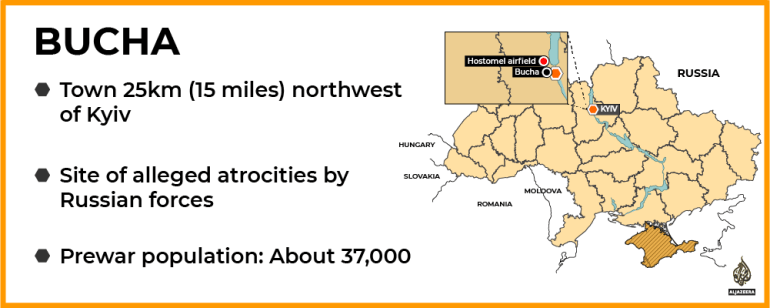
700 civilians dead in Chernihiv: Mayor
At least 700 people have been killed by Russian troops in the northern Ukrainian city of Chernihiv, its mayor has said.
“I can give a preliminary figure – 700 people. It combines the servicemen and civilians,” Vladislav Atroshenko said during an online video briefing.
He said some 70 bodies cannot be identified, and there are some 40 missing persons. He added that if people were within 50 meters from a bomb explosion, their bodies burned completely.
Less than 95,000 people have stayed in Chernihiv, whose pre-war population was 290,000, he said.
Reporting by Al Jazeera’s Mansur Mirovalev in Vinnytsia, Ukraine
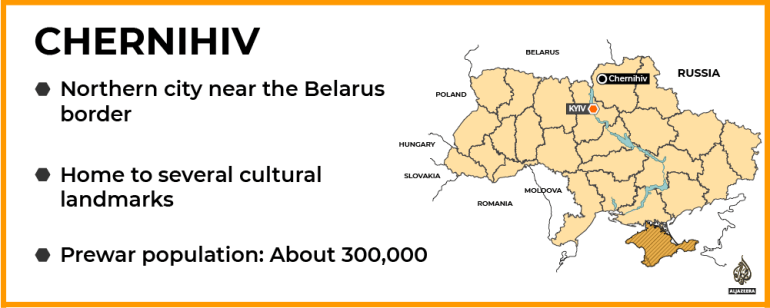
Food prices soar to record levels
Prices for food commodities such as grains and vegetable oils reached their highest levels ever last month because of Russia’s war in Ukraine and the “massive supply disruptions” it is causing, the United Nations has said.
The UN Food and Agriculture Organization said its Food Price Index, which tracks monthly changes in international prices for a basket of commodities, averaged 159.3 points last month, up 12.6 percent from February.
As it is, the February index was the highest level since its inception in 1990.
Slovakia says it has given S-300 air defence system to Ukraine
Prime Minister Eduard Heger has said Slovakia has given its S-300 air defence system to Ukraine to help it defend against Russian attacks.
“I can confirm that the Slovak Republic has donated the S-300 air defence system to Ukraine, following Ukraine’s request for assistance,” Heger wrote.
Heger said the donation of the Soviet-made anti-aircraft batteries did not mean that the European Union and NATO member had joined the conflict with Russia.
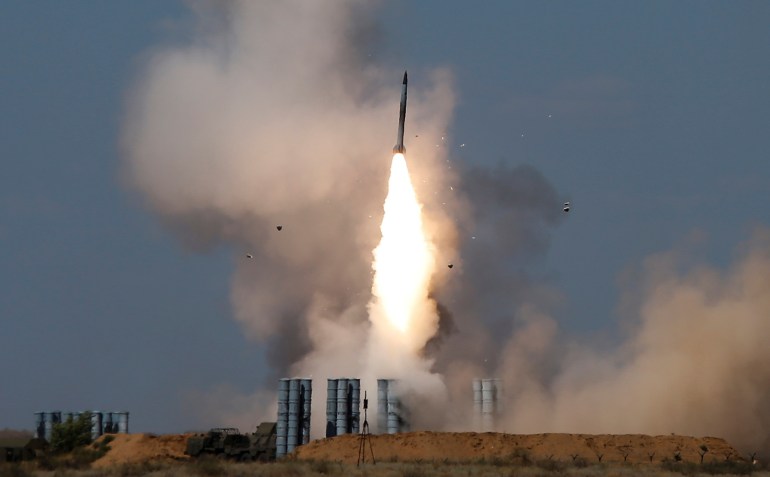
Death toll in Kramatorsk rises to 40
The death toll from the Russian missile strike on a railway station in the southeastern city of Kramatorsk has risen to 40, police have said.
Four of them are children, the Donetsk region police department said in a statement.
Russia has denied it launched the strike.
Reporting by Al Jazeera’s Mansur Mirovalev in Vinnytsia, Ukraine
EU has frozen 30bn euros in Russian, Belarusian assets
The EU has so far frozen nearly 30 billion euros in assets from blacklisted Russian and Belarusian individuals and companies under sanctions imposed for Moscow’s war in Ukraine.
A total of 29.5 billion euros ($32 billion) “including assets such as boats, helicopters, real estate and artwork” have been seized and another 196 billion euros of transactions have been blocked, the European Commission has said said in a statement.
Ukraine: Four children among Kramatorsk victims
The death toll from the Russian missile attack on a railway station in the southeastern city of Kramatorsk has risen to 35, an intelligence official said.
Four victims are children, Artyom Dehtyarenko of the Ukrainian Security Service said on Facebook.
Officials said earlier that Russia “deliberately” hit the overcrowded railway station where thousands of civilians were awaiting evacuation trains.
Reporting by Al Jazeera’s Mansur Mirovalev in Vinnytsia, Ukraine
Russia denies attack on Kramatorsk railway station: RIA
Russia’s defence ministry has denied that Russian forces were responsible for an attack on a railway station in Kramatorsk in eastern Ukraine on Friday, the RIA news agency reported.
Ukraine’s state railway company says more than 30 people were killed in the attack, which occurred as civilians were trying to evacuate to safer parts of the country.
The defence ministry said the missile was a type used only by Ukraine, and similar to one that hit the centre of the city of Donetsk on March 14, killing 17 people, RIA reported.
Zelenskyy: Russia ‘evil’ with ‘no limits’
Ukrainian President Zelenskyy has called Russia an “evil” country with “no limits” after the deadly attack on a railway station in Kramatorsk.
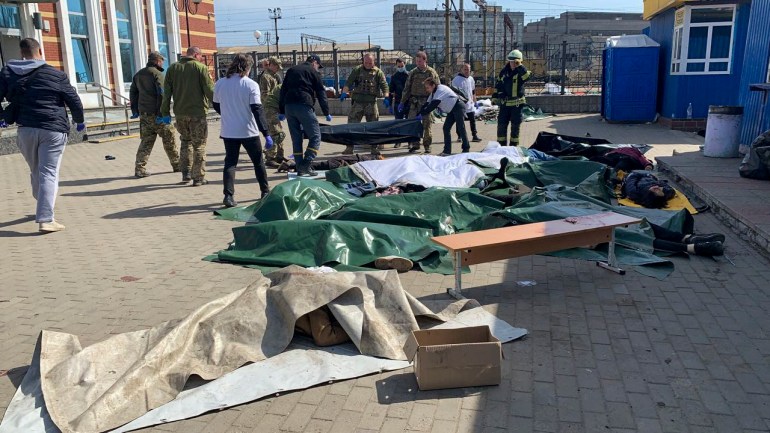
Kramatorsk mayor says thousands were at station during attack
The city’s mayor, Oleksander Honcharenko, has said there were about 4,000 civilians at the city’s railway station when it was hit by what Ukrainian officials say were Russian rockets.
He said many were elderly, women and children.
UK sanctions daughters of Russia’s Putin and Lavrov
The United Kingdom has announced sanctions on the daughters of Russian President Vladimir Putin and Foreign Minister Sergey Lavrov over Moscow’s invasion of Ukraine.
The Foreign Office said it was targeting the “lavish lifestyles of the Kremlin’s inner circle”. The move mirrored sanctions imposed by the US.
Ukraine says Russia’s losses reach 19,000
About 19,000 Russian servicemen have been killed in Ukraine since the invasion started on February 24, Ukraine’s military has said.
Ukrainian forces destroyed some 700 tanks, 1,891 armoured vehicles, 150 planes, 135 helicopters and 112 drones, the General Staff of the Armed Forces said on Facebook.
NATO said on March 24 that Moscow lost up to 15,000 soldiers in Ukraine – a figure compared with the USSR’s overall death toll during the 1979-89 Soviet-Afghan war.
Reporting by Al Jazeera’s Mansur Mirovalev in Vinnytsia, Ukraine
EU adopts new sanctions against Russia
The EU has formally adopted its fifth package of sanctions against Russia, including bans on the import of coal, wood, chemicals and other products.
The measures also prevent many Russian vessels and trucks from accessing the EU, further crippling trade, and will ban all transactions with four Russian banks, including VTB.
Russian missile kills more than 30 in Kramatorsk: Officials
A Russian attack at a railway station in Kramatorsk has killed more than 30 people and wounded more than 100, Ukrainian officials said.
Regional Governor Pavlo Kirilenko called the assault a deliberate attack on the area, where hundreds had gathered to evacuate.
Kramatorsk has been heavily shelled for weeks.
Alexander Kamyshin of the Ukrainian Railroads said on Telegram: “This is a deliberate strike at passenger infrastructure of the railroad and on the residents of Kramatorsk.”
Reporting by Al Jazeera’s Mansur Mirovalev in Vinnytsia, Ukraine
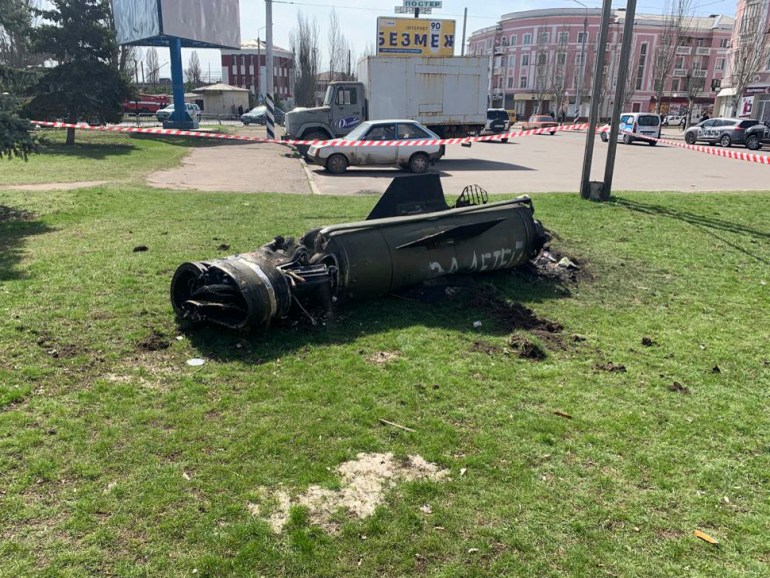
Ukrainian negotiator: Bucha deaths affect mood at talks with Russia
Ukraine and Russia are “constantly” holding peace talks online but the mood has been affected by the events in Bucha, Ukrainian negotiator Mykhailo Podolyak said in televised comments.
Ukrainian officials accuse Russian troops of extrajudicial killings in Bucha, outside Kyiv, where mass graves and hundreds of corpses have been discovered.
Moscow denies targeting civilians in Ukraine and has said the deaths in Bucha were a “monstrous forgery” staged by the West.
Russia says it destroyed training centre for ‘mercenaries’ near Odesa
Russia has said it destroyed a training centre for “foreign mercenaries” near the city of Odesa as part of its military campaign in Ukraine.
“High-precision missiles of the Bastion coastal missile system destroyed a foreign mercenary assembly and training centre near the village of Krasnosilka, northeast of Odesa,” a defence ministry spokesperson said in a briefing.
Three civilians tortured, burned in Kharkiv region: Prosecutors
Three people have been tortured, killed and burned in the eastern Ukrainian region of Kharkiv, prosecutors have said.
Russian troops used car tyres to burn bodies in a basement in the village of Husarivka, the regional prosecutor’s office said on Telegram.
Hundreds of civilians have been tortured and arbitrarily shot since the invasion began on February 24, according to survivors, officials, rights groups and media reports.
Reporting by Al Jazeera’s Mansur Mirovalev in Vinnytsia, Ukraine
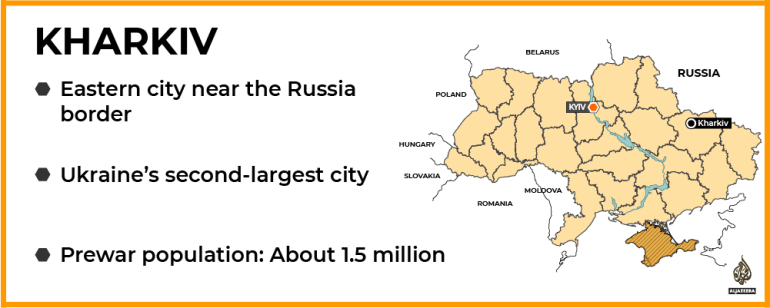
Von der Leyen, Borrell head to Kyiv to meet Zelenskyy
European Commission President von der Leyen and the EU’s foreign policy chief Borrell are on their way to Ukraine’s capital to meet President Zelenskyy.
Von der Leyen is later set to attend a Stand Up For Ukraine event in Warsaw, Poland.
Looking forward to Kyiv.@JosepBorrellF @eduardheger pic.twitter.com/YFAgGr5Tlc
— Ursula von der Leyen (@vonderleyen) April 8, 2022
Russia focusing on control of Luhansk cities, says Ukraine army
Russian forces are concentrating on taking control of Popasna and Rubizhne, cities in the Luhansk region of eastern Ukraine, the General Staff of the Armed Forces of Ukraine wrote on Facebook.
“The Russian enemy continues to blockade the city of Kharkiv. To prevent the advance of our troops, the invaders put up minefields,” the post adds.
It also warned of possible missile attacks from Belarus.
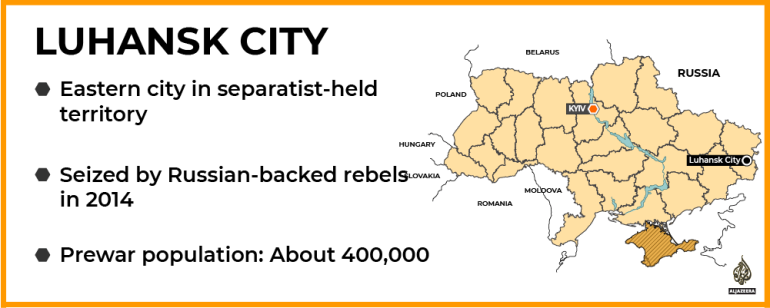
Russian forces fully withdrawn from Ukraine’s north: UK
Cities in Ukraine’s east and south continue to be shelled while Russian forces have advanced further south from the city of Izyum, which remains under their control, according to Friday’s intelligence briefing from the UK’s Ministry of Defence.
“In the north, Russian forces have now fully withdrawn from Ukraine to Belarus and Russia,” the briefing says, adding that some of these will be transferred to fight in the eastern region of Donbas.
They will require significant replenishments before redeployment “with any mass redeployment from the north likely to take at least a week minimum”.
Latest Defence Intelligence update on the situation in Ukraine – 8 April 2022
Find out more about the UK government's response: https://t.co/lrfW1pqwQe
🇺🇦 #StandWithUkraine 🇺🇦 pic.twitter.com/WPHtWTQEnp
— Ministry of Defence 🇬🇧 (@DefenceHQ) April 8, 2022
Germany says Russian radio messages discussed Bucha killings
Germany says it has intercepted radio conversations in which Russian troops discussed civilian killings in Bucha.
German magazine Der Spiegel said the country’s foreign intelligence service, the BND, obtained conversations among Russian soldiers.
In one intercepted message, a soldier is seemingly heard telling another that they had shot a person riding a bicycle. Images of a body lying next to a bicycle recently surfaced following the withdrawal of Russian forces from the Bucha area.
Read more here.
DER SPIEGEL has learned that German intelligence intercepted radio traffic from the #Russian military regarding the murder of civilians in #Bucha. It appears that such atrocities were part of the plan.https://t.co/WqJ93GdP2p
— SPIEGEL English (@SPIEGEL_English) April 7, 2022
Sumy region littered with explosives, governor warns
The governor of Ukraine’s Sumy region has told residents the area is free of Russian troops but still unsafe due to land mines.
“Do not drive on the roadsides and do not use forest roads. Do not approach destroyed equipment or orc sites!” Dmytro Zhyvytskyi said on Telegram.
“If you hear explosions (and there have been many in recent days) – it’s rescuers and explosives. They are neutralising the ammunition left by the Russian military on our land,” he added.
Ukrainians have commonly referred to Russian soldiers as “orcs” since the beginning of Russia’s invasion of the country.
Armoured vehicles requested by Zelenskyy leave Australia for Ukraine
The first of 20 Bushmaster vehicles have left Australia for Ukraine, a week after Ukraine requested the Australian-manufactured armoured vehicles.
“The Bushmaster is well suited to provide protection to the Ukrainian Armed Forces soldiers and Ukrainian civilians against mines and improvised explosive devices, shrapnel from artillery and small arms fire,” said Australia’s Prime Minister Scott Morrison.
“Additionally, a Ukrainian flag is painted on either side with the words ‘United with Ukraine’ stencilled in English and Ukrainian to acknowledge our commitment and support.”
It is a historic moment! Upon the invitation from @PeterDutton_MP, I was pleased to witness the transfer of 20 PMVs Bushmaster to Ukraine worth 50 million AUD (38 million USD). It’s a significant boost to Ukraine’s defence capabilities. pic.twitter.com/RjpyGuxRJX
— Vasyl Myroshnychenko (@AmbVasyl) April 7, 2022
Serbia’s UN vote against Russia driven by fear of sanctions, president says
Serbia voted for suspending Russia’s membership of the UN Human Rights Council fearing sanctions against it, President Aleksandar Vučić said.
“People ask why we didn’t vote against or why we didn’t abstain,” Vučić said on Serbia’s public broadcaster, Radio Television of Serbia.
He said if Serbia abstained, more countries would be against them “and the pressure will become even greater. At the same time, today a decision is being made about the fate of Serbia – whether we will be an exception from the package of sanctions on oil”.
Gazprom Neft, one of the Russian-owned companies sanctioned by the EU, is the majority shareholder of the Petroleum Industry of Serbia.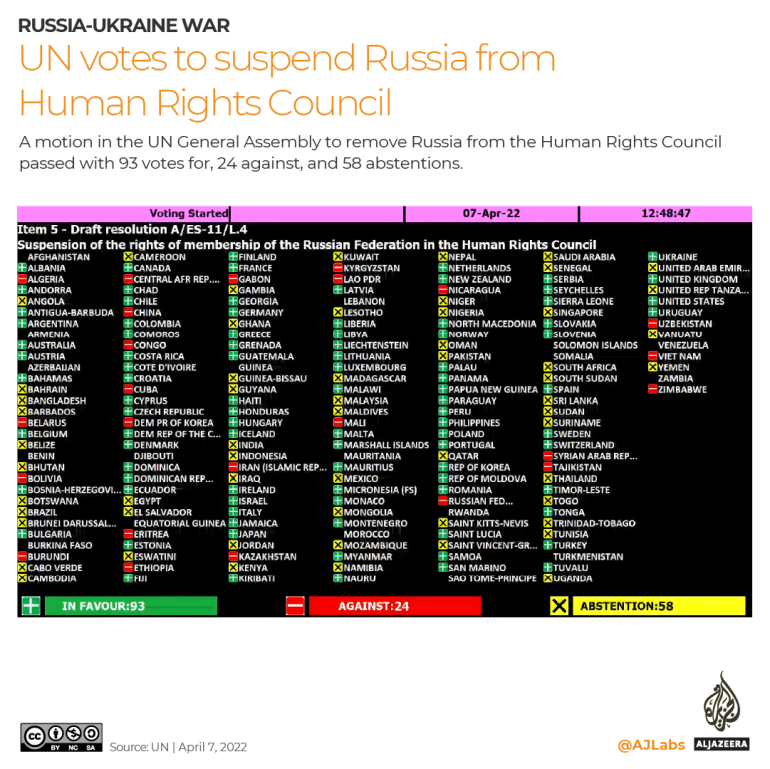
Zelenskyy says Russia will use dead Ukrainians in propaganda campaign against his country
Russian propagandists are planning to use the bodies of Mariupol victims to stage a scene that can be blamed on Ukraine, Zelenskyy has said.
“They are going to show the victims in Mariupol as if they were killed not by the Russian military, but by the Ukrainian defenders of the city. To do this, the occupiers collect corpses on the streets, take them out and can use them elsewhere in accordance with the elaborated propaganda scenarios.”
Zelenskyy called it a “mirror response” to what people saw in Bucha. Russia has claimed the atrocities in Bucha, where bodies of shot civilians lined the streets, were staged by Ukrainians.
US sanctions Russia’s shipbuilding and diamond mining companies
The Biden administration has announced sanctions against Russia’s largest military shipbuilding and diamond mining companies, blocking their access to the US financial system.
Alrosa is the world’s largest diamond mining company and accounts for about 90% of Russia’s diamond mining capacity, according to the US Treasury Department. Diamonds are one of Russia’s top 10 non-energy exports by value.
The US State Department also said it was blacklisting the United Shipbuilding Corporation, along with its subsidiaries and board members.
Killings in Mali underscore Russia’s ‘malign activity’ beyond Ukraine, UK ambassador
The UK deputy representative to the UN, James Kariuki, has said reports of the massacre in the Malian town of Moura underline the extent of “Russia’s malign activity around the world, beyond Ukraine”.
“We know that, as of early 2022, around 1,000 Russian mercenary personnel have been stationed across Mali. Just as the presence of Russian mercenaries drove an increase in human rights violations and abuses in the Central African Republic last year, we fear we are now seeing the same in Mali,” Kariuki told the UN’s Security Council.
A Human Rights Watch (HRW) investigation revealed about 300 civilians and suspected members of armed groups were allegedly executed in Moura during an operation by Malian forces and foreign fighters. HRW says several sources identified the foreign fighters as Russians.
Russian mercenaries have reportedly been deployed to Africa as part of the Wagner Group, a paramilitary unit that was also allegedly aiding Russian separatists in Ukraine’s eastern Donbas region. Russia has consistently denied the group’s connection to the state.
#UNSC meets today to discuss #Mali. We pay tribute to UN peacekeepers serving in #MINUSMA
Horrified by reports of massacre in Moura last week. Alleged role of Wagner mercenaries underlines the extent of Russia’s malign activity around the world, beyond Ukraine. pic.twitter.com/YPty0P4kt9
— Ambassador James Kariuki (@JamesKariuki_UN) April 7, 2022
Destruction in Chernihiv as Russian troops retreat
Russian troops retreating from the northern Ukrainian city of Chernihiv left behind crushed buildings, streets littered with destroyed cars and residents in dire need of food and other aid, the Associated Press news agency reports.
Dozens of people lined up to receive bread, diapers and medicine from vans parked outside a shattered school now serving as an aid-distribution point in Chernihiv, which Russian forces besieged for weeks as part of their attempt to sweep south towards the capital before retreating.
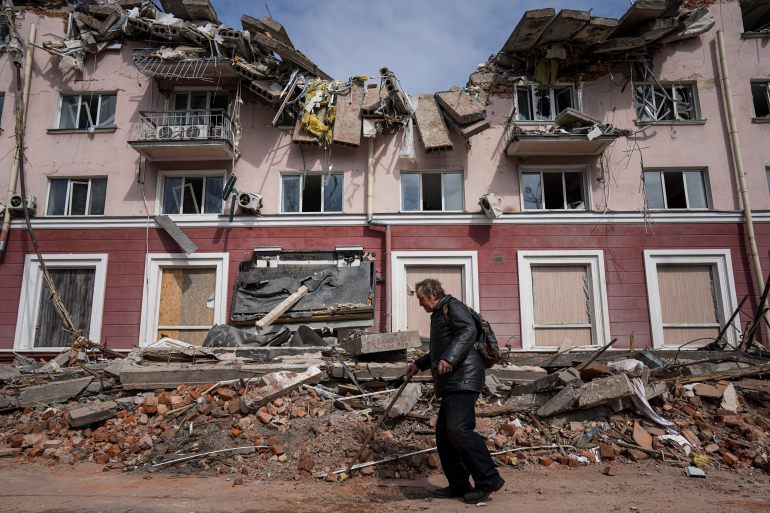
Russia’s suspension from UN rights body sends strong signal: Rights groups
The vote to suspend Russia from the UN Human Rights Council has strengthened the forum and sent a powerful message that violators cannot be members, rights organisations say.
“This sends a powerful message that the Human Rights Council is no place for states that are perpetrating massive human rights violations, including acts that amount to war crimes and crimes against humanity,” said Phil Lynch, executive director of the International Service for Human Rights.
That was echoed by Human Rights Watch, which said in a statement that the UNGA “sent a crystal-clear message to Russia’s leadership that a government whose military is routinely committing horrific rights violations has no business” on the council.
New Zealand to release more barrels of crude, diesel
The government of New Zealand has announced plans to release 184,000 barrels of crude and close to 299,000 barrels of diesel to the International Energy Agency emergency stock release.
“There has been a great deal of volatility in global oil markets since the invasion [of Ukraine],” the country’s minister of energy and resources, Megan Woods, said in a statement.
“This further action, coupled with the United States’ move to release 180 million barrels of oil over the next six months, will help to provide some certainty to the market.”
Situation in second Ukraine town ‘more dreadful’ than Bucha: Zelenskyy
Zelenskyy has said that the situation in the town of Borodyanka was “significantly more dreadful” than in nearby Bucha, where Russian forces’ suspected killings of civilians have been broadly condemned.
“The work to clear the rubble in Borodyanka has begun … It’s significantly more dreadful there. Even more victims from the Russian occupiers,” Zelenskyy said in a video posted on the Telegram messaging service.
The town is about 25km (15 miles) from Bucha.
Canada boosts financial aid to Ukraine in new budget
Canada has increased financial support for Ukraine as the government of Prime Minister Justin Trudeau unveiled its new federal budget.
Finance Minister Chrystia Freeland said the budget earmarked an additional $800m in loans through the International Monetary Fund, as well as $400m in military aid.
“The brave people of Ukraine are fighting our fight—a fight for democracy—it is in our urgent national interest to ensure that they have the missiles and the money they need to win,” Freeland tweeted.
The brave people of Ukraine are fighting our fight—a fight for democracy—it is in our urgent national interest to ensure that they have the missiles and the money they need to win.
— Chrystia Freeland (@cafreeland) April 7, 2022
Ukrainian villagers say Russian forces used them as ‘shields’
In the village of Obukhovychi, residents say Russian forces dug in around their houses, using them as “shields” to discourage counterattacks by Ukrainian armed forces.
“They dug the trenches to put the vehicles in and used us as a shield,” said 35-year-old Yulia Piankova.
“It’s bad that they didn’t go into the field to fight, but they came to where they knew that many people were,” she said.
More than 100 attacks on healthcare in Ukraine: WHO
The World Health Organization (WHO) says it has confirmed more than 100 attacks on healthcare facilities and other services in Ukraine since Russia’s invasion began.
“As of now, WHO has verified 103 incidents of attacks on health care, with 73 people killed and 51 injured, including health workers and patients,” WHO Director-General Tedros Adhanom Ghebreyesus said during a news conference.
Of the confirmed attacks, 89 had impacted health facilities and most of the rest hit transport services, including ambulances.
“We are outraged that attacks on health care are continuing,” the WHO chief said, adding they constituted “a violation of international humanitarian law”.
Zelenskyy calls for more sanctions and supplies
Ukraine’s president has called for nations to impose “more courageous sanctions” against Russia in order to end the war.
“If sanctions had really worked at 100 percent, then it wouldn’t have been necessary to explain their importance in such a detailed and meticulous way,” Zelenskyy said during his daily address.
“That’s why I underline once again that we need more sanctions, more courageous sanctions,” he said.
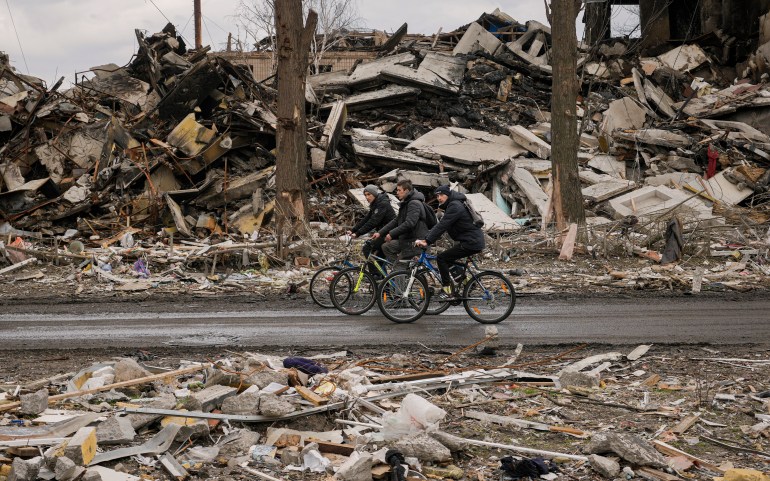
Germany to give $2.2bn to federal states to aid Ukraine refugees
The German government will provide $2.2bn to federal states to cover the cost of caring for and integrating Ukrainian refugees in the country, Scholz has said.
“The agreement is a good basis for our country to stand together in the long-term,” Scholz said after a meeting with the premiers of Germany’s 16 states.
Germany has registered approximately 307,000 refugees from Ukraine, the interior ministry said.
Germany will need to use transition period to implement coal ban: Scholz
German Chancellor Olaf Scholz has said Germany will need to use the full transition period to implement a ban on Russian coal under EU sanctions.
The EU’s ambassadors agreed on a fifth sanctions package on Russia, including a coal embargo, with a 120-day wind-down period to give member states time to find alternative suppliers.
Pink Floyd members reunite to record song for Ukraine
British rock band Pink Floyd will release a new song on Friday to raise money for humanitarian relief in Ukraine, featuring the vocals of a Ukrainian singer who quit an international tour to fight for his country and was wounded.
The single “Hey Hey, Rise Up” – Pink Floyd’s first original new music in almost 30 years – was recorded last week and highlights singing by Andriy Khlyvnyuk from Ukrainian band Boombox, which was taken from an Instagram post.
“Then I saw this incredible video on Instagram, where he stands in a square in Kyiv with this beautiful gold-domed church and sings in the silence of a city with no traffic or background noise because of the war,” guitarist David Gilmour said on Pink Floyd’s website.
“It was a powerful moment that made me want to put it to music.”
Number of Ukrainians arriving at Mexico-US border doubles
The number of Ukrainians arriving at the US-Mexico border to seek asylum in the US has more than doubled in less than a week, officials have said.
Lying on plastic mattresses, hundreds of Ukrainians — including families — waited in a crowded shelter run by the local government in the Mexican border city of Tijuana this week.
Enrique Lucero, director of Tijuana’s immigration services, said about 2,829 Ukrainians were waiting, more than double the 1,200 counted last Friday. Nearly two-thirds of them were in shelters, with the rest in hotels and churches, he said.
See more images from the US-Mexico border here.
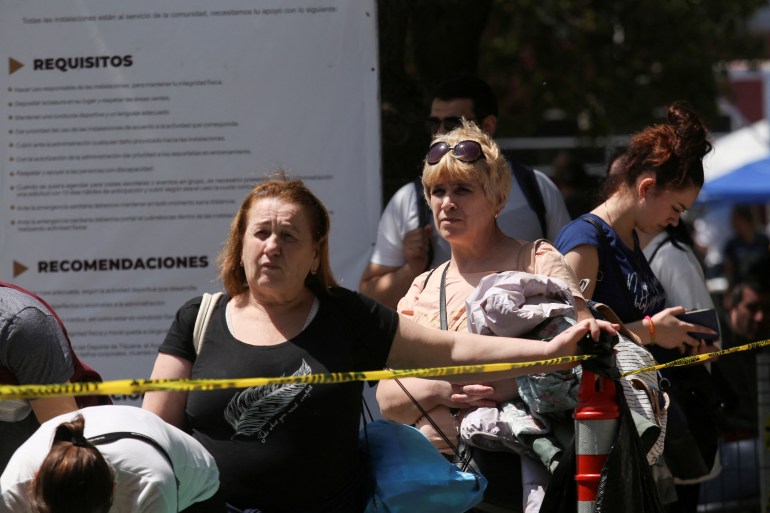
UN rights council suspension shows Russia as ‘international pariah’: Biden
US President Joe Biden has welcomed the UN vote to suspend Russia from the UN Human Rights Council as a “meaningful” step that shows Moscow has become an “international pariah”.
“Russia has no place on the Human Rights Council,” Biden said in a statement.
“After today’s historic vote, Russia will not be able to participate in the Council’s work or spread its disinformation there as the Council’s Commission of Inquiry investigates Russia’s violations and abuses of human rights in Ukraine.”
Russia acknowledges ‘significant’ troops losses in Ukraine
Russia has appeared to give the most damning assessment so far of its invasion, describing the “tragedy” of mounting troop losses and the economic hit it has suffered since the war began in late February.
“We have significant losses of troops,” Kremlin Spokesperson Dmitry Peskov told Britain’s Sky News.
“It’s a huge tragedy for us,” he said.
"We have significant losses of troops".
Vladimir Putin's press secretary Dmitry Peskov says it's a "huge tragedy to us" to have lost Russian troops during the war in Ukraine.https://t.co/X3flQUBL0r
📺 Sky 501, Virgin 602, Freeview 233 and YouTube pic.twitter.com/PGHoFvdewb
— Sky News (@SkyNews) April 7, 2022
EU approves embargo on Russian coal, official says
The EU has said it approved an embargo on Russian coal as well as the closing of the bloc’s ports to Russian vessels.
An official from the French presidency of the European Council said the moves spearhead a “very substantial” fifth round of sanctions against Moscow, which will also include a ban on high-tech exports.
The coal ban should cost Russia $4.4bn a year, the EU’s executive commission said.
US Congress votes to suspend Russia trade status, enact oil ban
The US Congress has voted overwhelmingly to suspend normal trade relations with Russia and ban imports of Russian oil.
“We in Congress must do all we can to end the slaughter of innocent civilians, total destruction of cities, and assault on democracy in Ukraine,” said Representative Richard Neal.
The measures now go to President Joe Biden to be signed into law.
Read more here.
US plans to starve Russia’s ‘war machine’: Official
The US is ramping up sanctions against Russia to deprive its “war machine” of money, US Deputy Treasury Secretary Wally Adeyemo has said, but added that curbing Moscow’s main source of funding – exports – will take time.
“What this means is that Russia will be deprived of the capital it needs to build up its economy, but also to invest in its war machine,” Adeyemo said in an interview with the Reuters news agency.
“Because of our ability to produce energy at home, we were able to ban the Russian import of oil to America rather quickly,” he said. “It’s going to take them more time but what they’re doing is they’re reducing their dependence over time.”
UN aid chief ‘not optimistic’ about Ukraine ceasefire
The UN’s humanitarian chief, Martin Griffiths, has said he is not optimistic about securing a ceasefire to halt the fighting in Ukraine following high-level talks in Moscow and Kyiv.
“I think it’s not going to be easy because the two sides, as I know now … have very little trust in each other,” he said in an interview with The Associated Press news agency.
“I’m not optimistic,” he added later.
Russian Nobel laureate Muratov attacked with red paint
The Russian co-winner of last year’s Nobel Peace Prize, Dmitry Muratov, has said that he was attacked on a train with red paint, in an apparent protest at his newspaper’s coverage of the Russian invasion of Ukraine.
“They poured oil paint with acetone all over the compartment. Eyes burning badly,” Muratov’s Novaya Gazeta investigative newspaper quoted him as saying.
Pictures posted by the newspaper on the Telegram messaging app showed Muratov with red paint on his head and clothes and around his sleeping compartment on a Moscow-Samara train.
❗️Неизвестный напал на главреда «Новой газеты» и лауреата Нобелевской премии мира Дмитрия Муратова прямо в вагоне поезда pic.twitter.com/xrhR62zJts
— Новая газета Европа (@novayagazeta_eu) April 7, 2022
Welcome to Al Jazeera’s continuing coverage of the war in Ukraine.
Read all the updates from Thursday, April 7 here.